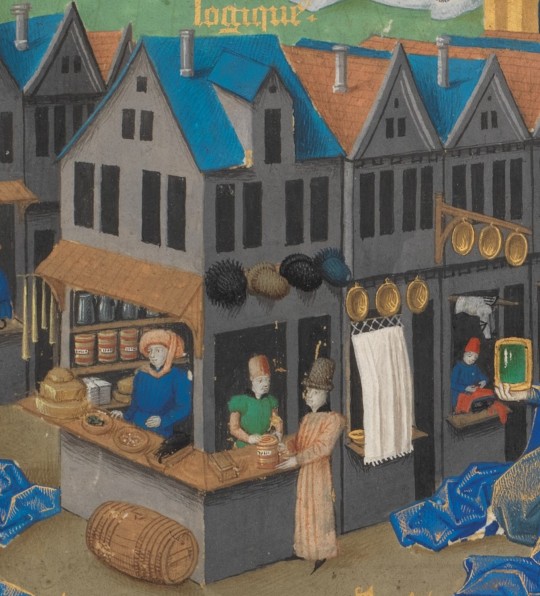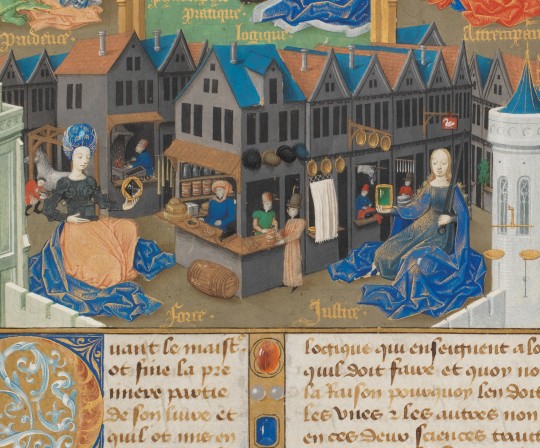Note
Is your name a reference to Lev Kamenev?
Yes, I wish to pay homage to comrade Lev Kamenev and his glorious beard.
1 note
·
View note
Text
Mancini, who left England around the time of Richard’s coronation, tells of men bursting into tears when Prince Edward was mentioned: ‘already there was a suspicion that he had been done away with.’6 If this was indeed the case – and it has, of course, been furiously disputed – it marked a departure from earlier precedent in that there was no funeral to confirm the fact of their death; but it is not difficult to imagine why that might have been. The funeral of two children would have been, to put it in modern terms, a public relations disaster. There is at least no doubt that contemporaries thought that they were dead, and acted accordingly. It is inconceivable that the predominantly Yorkist rebels against Richard III would have backed Henry Tudor, in most people’s eyes an exiled nonentity with no claim to the throne, as their candidate for king if they had thought that Edward’s sons were still available.
Richard III: A Failed King?, Rosemary Horrox
#literally WHAT would richard have to gain from secretly sending his nephews away#he was the immediate beneficiary of their deaths#it’s not like he or anyone living in 1483 could have predicted bosworth#richard iii#the princes in the tower#wars of the roses
40 notes
·
View notes
Text


medieval stores (& personified virtues)
from a copy of the encyclopedic "trésor" by brunetto latini, illuminated by the "master of the geneva latini", rouen, c. 1450-80
source: Genève, Bibliothèque de Genève, Ms. fr. 160, fol. 82r
438 notes
·
View notes
Text
Mancini, who left England around the time of Richard’s coronation, tells of men bursting into tears when Prince Edward was mentioned: ‘already there was a suspicion that he had been done away with.’6 If this was indeed the case – and it has, of course, been furiously disputed – it marked a departure from earlier precedent in that there was no funeral to confirm the fact of their death; but it is not difficult to imagine why that might have been. The funeral of two children would have been, to put it in modern terms, a public relations disaster. There is at least no doubt that contemporaries thought that they were dead, and acted accordingly. It is inconceivable that the predominantly Yorkist rebels against Richard III would have backed Henry Tudor, in most people’s eyes an exiled nonentity with no claim to the throne, as their candidate for king if they had thought that Edward’s sons were still available.
Richard III: A Failed King?, Rosemary Horrox
40 notes
·
View notes
Note
Hi there
So I follow the Tudor Trio and Nicola Tallis, Matthew Lewis and Nathan Amin were doing a debate today on the Princes in the Tower with the quote on quote new evidence that has been revealed from Philippa Langley.
I still firmly believe Richard III killed the Princes and find many of Matthew Lewis' arguments bizarre. I'm not sure why he thinks the Princes weren't a threat to Richard but were to Henry VII. If the Princes weren't a threat to Richard then why would they have been a threat to Henry VII? I can't understand why Richard would ever let them escape England of his own free Will. There is almost no chance they could have escaped without him knowing about it.
Also he claimed that Henry VII sent Elizabeth Woodville to Bermondsey Abbey and that she was supporting the Lambert Simnel Rebellion. Is there any truth to that? Thanks!
Hi, sorry for taking so long to reply! Lewis' arguments are so incredibly ridiculous — they largely rest on accepting at face value people's signatures and on the claim that Maximilian and Margaret of York were too blue-blooded to ever lie for political ends: essentially, he claims lying was for peasants. And yes, the princes would absolutely be a threat to Richard III as he found out as soon as he left London after his coronation — there happened a rebellion made by former Edwardian servants that aimed to free the princes from the Tower, very possibly to restore them to the throne. The princes had been raised all their lives to regard the English throne as their birthright — you're telling me they would grow up abroad and would neve try a restoration aided by one of England's political enemies such as France?
The ricardian claim that Richard III sent them to Burgundy is incredibly ridiculous to me as well: even if they stayed with Richard's sister, she wasn't the one ruling Burgundy — Maximilian of Austria, the husband of Margaret's deceased daughter-in-law, was. How could Richard be sure Maximilian wouldn't take the princes the minute Richard did something that went against Maximilian's interests and use them to either blackmail him or depose him so Maximilian could have his own English king? Burgundy had displayed lancastrian loyalties not so long ago in the past and the political game in Europe changed constantly.
It would have been absolutely STUPID of Richard III to deliver the strongest weapon anyone could use against him to a foreign power. Let's also mention that Maximilian at the time was struggling with controlling his own children, the actual Burgundian heirs, because some Flemish cities had rebelled against him and had his heir (Philip of Burgundy) in their power and were up in arms against his regency. From June 1483 to July 1485 Maximilian couldn't have control of his own son. You're telling me Richard would have sent the biggest assets anyone could use against him to that unstable scenario?
The truth is that Ricardians like Matthew Lewis benefit from the fact that people study/know about the Wars of the Roses from an impossibly anglocentric lens, ignoring that the conflict was also the outcome of the multiple iterations of power play between Western European powers: 'the Wars of the Roses were an extended episode in a European conflict, not just a murderous private dispute'. It really is inconceivable, when it comes down to logic, how Richard was one step ahead of everyone during the mounting off to his takeover of the throne (bamboozling and imprisoning the Woodvilles, executing and imprisoning Edward V's strongest supporters such as Hastings) but would commit such a basic political error as sending other claimants to his own crown to a foreign power.
As to Elizabeth Woodville going to Bermondsey Abbey as a way of punishment for her supporting a rebellion against Henry VII, it makes little sense as well. Henry VII carried on with the marriage negotiations with Scotland that involved Elizabeth and two of her daughters until James III's death in 1488. Again, it would make little sense for Henry VII to have found out Elizabeth was conspiring against him but keep wanting to send her north as an ally to Scotland, a country that could easily make war on him and create problems. Why would he deliver an enemy into the hands of another possible enemy, if Elizabeth truly conspired against him? Again, it's the lack of perspective into Europe and international politics that jump out in Lewis' logic.
Do my words make sense to you? I truly cannot comprehend how Lewis can say the stuff he says and no one really contradicts him in his logic.
#not to mention lambert simnel was definitely a fake#but that didn’t stop lincoln or margaret of burgundy from supporting him lol#ricardian nonsense#henry vii#richard iii#the princes in the tower#wars of the roses
20 notes
·
View notes
Text
academic bias is so funny because you’ll be reading about the same historical event and one person is like “Despite the troubles that befell his homeland and near constant criticism of the court King Blorbo remained strong in the face of adversity” and the other one is like “after letting his people carry the brunt of his cringefail decisions Blorbo the Shitface refused to listen to any reason and continued to be a warmongering piece of shit. Also he was ugly.”
26K notes
·
View notes
Text

It's almost Valentine's! I was able to finish the Henry VI and Margaret of Anjou piece for my Wars of the Roses series <3
Henry VI tends to be brushed off as a mentally-ill and ineffective monarch to this day, and it's difficult to find information that does not infantalize or malign him. Margaret of Anjou, my favorite figure from this period, would was a steadfast pillar of support for Henry until the day he died. A lot of historians paint Margaret as only supporting her husband to secure the throne for their son, but I find that narrative difficult to be the only reason. Margaret campaigned for Henry's release from captivity tirelessly and worked extremely hard to gather support for his reign and even raised armies for him. While their relationship doesn't have the passion and flare that Edward IV and Elizabeth Woodville did, I think their kind of devotion is exemplary in royal diplomatic marriages from the period.
228 notes
·
View notes
Text

81K notes
·
View notes
Text
not enough respect for ednyfed fychan ap cynwrig on here
#ednyfed served cunt#(and the welsh princes ig)#proud grandpa watching his tudor descendants fuck and kill their way to the english throne lol#ednyfed fychan#tudors of penmynydd
2 notes
·
View notes
Text
Proposing creating a Fifth Branch of the Mabinogi where Blodeuedd gets a gun.
241 notes
·
View notes
Link
Russian pupil Ilya Gavrichenko told his parents he was playing the Soviet despot, and so as requested, they made his outfit, including army boots, the red stripe on his military trousers, and a marshal’s jacket.
“We even got him a perfect moustache,” said his father Fedor, from St Petersburg. “We were all ready for him to be a success.”
It was only when they arrived at the performance that the horrified parents realised this was a nativity play and their 12-year-old son was supposed to play a very different role - Joseph of Nazareth.
“He was supposed to accompany the Virgin Mary but there was no time to change the outfit,” said his father.
“Each time he went out on stage, the mothers were in hysterics, crying and yowling from somewhere under their chairs.
“My son was lost because of mixing up the part he was playing, and feeling guilty for having done so.”
hahaa
19K notes
·
View notes
Text
Also, let us not forget, Henry Kissinger died. I understand that 2023 was generally a shitshow in a lot of ways, but Henry Kissinger very much did die.
23K notes
·
View notes
Text

Rouen Cathedral, ©1977 Allan T. Kohl; Minneapolis College of Art and Design
148 notes
·
View notes
Text
This pretty much encapsulates the core problem with the Richard III Society’s approach to history: rather than allowing the evidence to lead them to a conclusion, they start with the conclusion (ie. “Richard III was maligned and was actually innocent of everything he was accused of”) then work backwards to find the evidence to support it.
Unfortunately for everyone, the “evidence” is almost always a deliberate misinterpretation of the sources, pure conjecture, or just straight up fanfiction pulled out of their asses (eg. the Beaufort birther conspiracy theory).
The most I can say for Matthew Lewis is that at least he seems to be a decent person (crackpot opinions, notwithstanding), which is more than what I can say for the many far-right English ethno-nationalists and delusional Brides of Gloucester currently infecting the RIII Society.
Was Lambert Simmel Edward V? No, absolutely not.
Okay, I read this insane take from Matthew Lewis.
Apparently, it's only on his blog and not part of his various books on the Yorkist family, which I get, considering how batshit it is.
So I'll break down this point by point.
"Why do we think we know that the Yorkist uprising of 1487 favoured Edward, Earl of Warwick? In reality, it is simply because that was the official story of the Tudor government. It made the attempt a joke; a rebellion in favour of a boy who was demonstrably a prisoner in the Tower, who indeed was paraded at St Paul’s for the masses and (perhaps more importantly) the nobility to see. "
This argument is very dubious. I think the reverse argument can simply be made against Henry VII: his early reign was so shaky that a fake boy could dramatically question it.
"‘And there was taken the lade that his rebelles called King Edwarde (whoos name was in dede John) – by a vaylent and a gentil esquire of the kings howse called Robert Bellingham.’"
Is it possible that all references to a regnal number were erased from the record because of the fallout it would cause Henry?
His first arguments are contemporary sources calling Lambert 'John' and without his regnal number (V or VI?) as the first proof that something's shady. Lewis here forgets that medieval accounts weren't that great with names, and the author could simply have made a mistake. It's worth recalling that the municipality of York, for instance, did believe that Norfolk betrayed Richard III at Bosworth when he died for him. Instances of early mistakes such as that are many. As for whether Lambert, pretending to be the earl of Warwick, it is normal that the rebels would hesitate on his regnal number. The deposition of Edward V shocked many, but Warwick was essentially a Ricardian heir. The rebels' best solution was to ignore the issue until victory. If Lambert was called Edward V, it would mean that the rebels (essentially former supporters of Richard III) didn't recognize Edward V.
"Clearly, the boy was widely accepted in Ireland, with only Waterford remaining staunchly loyal to Henry VII. Here too, we have no reference to a regnal number that might help clear up the matter of who the boy was claiming to be. The act of a coronation is unusual though. Perkin Warbeck, in all his years claiming to be Richard, Duke of York, the younger of the Princes in the Tower, never underwent such a ceremony."
Simmel indeed received enormous Irish support, but Waterford wasn't the only one to refuse allegiance. Lord Fitzhugh and the Butlers also kept their allegiance to Henry VII, and they were major nobles in Ireland. Perkin Warbeck never underwent a coronation because he never had a major English city with the upper clergy necessary to make it. Warbeck failed to take Waterford in 1495 and Exeter in 1497, and he might have planned a coronation there. Without any city, its cathedral and bishop Warbeck couldn't make an honorable enough coronation. He preferred to proclaim himself king at Boodmin Moor, which was enough to assert his claim.
It's noteworthy that Henry Tudor didn't make a coronation when he landed for the same reasons.
Lewis makes a convoluted comparison with Henry III but essentially: Simmel did a coronation in Dublin because he could, and any other pretenders would have done the same if he was him and had the time for it. It doesn't prove he was Edward V, son of Edward IV.
Lewis mentions the Annals of Ulster, which tell that the Fitzgeralds supported Edward son of Edward duke of York, and the last of his House. I don't think it's proof of anything because, as Lewis admits, the Annals don't talk much about English affairs and aren't knowledgeable about the War of the Roses. The Annals don't say he is Edward V; if he was, he wouldn't be the last of his house, considering Warwick's existence. It's a source that shows more broad confusedness and asymmetry of information in the Middles Ages than anything else.
‘Now that the King inherits the titles both of York and Lancaster, he will be better able to look after Ireland. There has been a similar dispute for the rule of Ireland between the Geraldines and the Butlers. The earls of Kildare and Desmond come of one stock, and have always held with the house of York, as was seen in the days of the King’s father, “when an organ-maker’s son (Lambert Simnel), named one of king Edward’s sons, came into Ireland, was by the Geraldines received and crowned king in the city of Dublin, and with him the earl of Kildare’s father sent his brother Thomas with much of his people, who with the earl of Lincoln, Martin Swart and others, gave a field unto the King’s father, where the earl of Kildare’s brother was slain.”’
This is one of Lewis' big proof. A letter was written in 1526 to Henry VIII talking about Lambert as a fake son of Edward IV. He also points to chronicler Bernard André saying that Simmel was pretending to be Edward IV's second son (so Richard, not Edward V).
Lewis kinda does my answer for me by saying that people can mistake Simmel for Warbeck, and Simmel did pretend to be Richard of Shrewsbury, second son of Edward IV, at first. What I'll might add is that Lewis simultaneously claim that the Tudors reforged history while... using Tudor or pro-Tudor sources against them. This is a bit paradoxical. I also want to add that André, more interested in the noble deeds and lineages of Henry VII and convinced of the imposture of his foes, simply didn't care enough to make sure to know whose identity they were taking. There wasn't much (self-)censorship, even amongst cultural circles close to the Tudor dynasty.
Then Lewis turns to the supporters of Simmel.
"The other key thing to consider in the events of 1487 are the actions of some of those who might have had a vested interest."
I completely agree. I think the best proof is who did and did not support Simmel in 1487.
"The involvement of the Woodville faction, or at least the suspicion of it, is further evinced by the arrest of Thomas Grey, Marquis of Dorset, at the same time as his mother was deprived of her property. Thomas was reportedly placed in the Tower, and when he protested that he had done nothing wrong, he was told that if he were really loyal to Henry VII, then he wouldn’t mind a spell in prison. The anecdotal story is a window into some strange Tudor logic, but also the fear that the broader Woodville faction was involved in the plot. The one thing that doesn’t add up is that Sir Edward Woodville, Elizabeth’s brother, was part of Henry’s army at Stoke Field. He seems to have escaped suspicion, perhaps not believing the story or maybe even ensuring he got there to see the boy for himself."
Lewis begins to pin the retirement of Elizabeth Woodville at Bermondsey as a potential proof that Simmel is indeed Edward V. He talks about the notion that it was a true retirement from temporal life, before linking this retirement with the arrest of the Marquess of Dorset, her son.
Lewis either ignored or forgot that the Marquess of Dorset was Warwick's guardian. He also forgot Dorset's attempted defection to Richard III in 1484. Dorset could have a vested interest in supporting Warwick, which he raised for years, and he could influence over and Henry VII, who was ways less appreciative of him. It's very noteworthy that Henry VII didn't arrest Edward or Richard Woodville but Thomas Grey alone. He was the weak link, not the other Woodville. Preventive arrest, in the case of the return of Edward V, would have concerned the other members of the Woodville family.
"John clearly overlooked his own perfectly good and perfectly legal claim in 1487. There was no question that he really was John de la Pole, yet he chose, we are told, to follow a fake boy from Oxford who claimed to be the Earl of Warwick, a boy who was legally barred from the succession. What could possibly have led John (and indeed others – Francis Lovell and Margaret of York, Duchess of Burgundy most significantly) to make that decision? Even if they had succeeded in their invasion and reached the real Warwick in the Tower (if that was the real Warwick – confused yet??), the boy had no natural support or power base to build a kingship on. John actually posed an altogether better option than Warwick. Something made him overlook his own claim, and the only better claim lay with Edward V or Richard, Duke of York."
The notion that Lincoln was named Richard III's heir rest mainly on Richard's grant to him of annuities from the Duchy of Cornwall and the nomination to the Lieutenancy of Ireland. He wasn't officially named heir, but merely hinted as a potential one.
Still, he had a claim. He didn't push it then for many reasons. It's possible that Margaret of York didn't agree to support it and wanted her brother's son on the throne. It was written that she and Clarence had a good relationship. Lewis also overlooks the sympathy that the House of York had in Ireland. Edward Plantagenet, the last scion of this house from a father born in Dublin, was attracting much more enthusiasm than a de la Pole.
Eventually, Edward, by the mere fact that he was the last Plantagenet had a better claim. Henry VII knew it as he never let Warwick out of the Tower of London while the de la Pole lived free in England for over a decade before the 1501 breakdown.
Some historians think Lincoln used Simmel as a pawn for his own royal ambitions. It's also possible Lincoln didn't want to push himself forward in case the entire rebellion failed, and he wanted to make his peace with Henry VII. In all, there are many reasons for him to push Simmel forward.
On the contrary, there isn't much reason for him to push Edward V forward. He approved his deposition and fought for Richard III at Bosworth. His potential claim is negated By Edward V's own claim. Lincoln's brothers would stay loyal to Henry VII against Perkin Warbeck too. Why abandons Henry VII for someone he didn't support in 1483?
Also, regarding support, Lewis completely ignores anyone outside the Yorkist and Woodvilles family. Besides Lincoln, the main supporters of the Simmel rebellion in England were the two lords of Scropes, Sir Thomas Broughton, various Harringtons, and gentry families of northern England. Their common point? They all supported Richard III. Most of them were his vassals before his usurpation. Why would they support Edward V against Henry VII? The two potential heirs of Richard III were Warwick or Lincoln, not the nephews he disinherited. It makes no sense for them to support someone their suzerain deposed over two of his potential heirs.
On the reverse, where are the supporters of Edward V? Those who rebelled in 1483 and were close to him or his father. Lewis named his mother and half-brother, but he had other supporters. For instance, Sir William Stanley and lord Fitzwalter would plot for Perkin Warbeck as he claimed to be Edward V's brother. Why did they support Henry VII if Simmel was Edward V? The same goes for many gentry families of the south and many Welsh noblemen close to the Council of Wales that Edward V presided over in the 1470s.
So those with 'vested interests' clearly didn't react as if Lambert Simmel was Edward V. In fact, they reacted as if Simmel was Richard III's last Plantagenet nephew and potential heir.
Lewis end with one final proof:
‘This same day at dinner, whereas these Lords of Ireland was at Court, a gentleman came where as they was at dinner, and told them that their new King Lambarte Symenell brought them wine to drink, and drank to them all. None would have taken the cup out of his hands, but bade the great Devil of Hell him take before that ever they saw him.’
This is a known anecdote of 1489 in which Irish lords who supported Simmel didn't recognize him. For Lewis, it's proof that Edward V was replaced by another feigned boy. The assertion is shaky, implying that Henry VII would willingly blow this cover-up by presenting it to former supporters. Lewis tries to extract himself from such contradiction by proposing that Henry VII was forcing them to admit their defeat. Considering that nobody tried to rebel in Simmel's name, they had already acknowledged it. And Lewis ignores the easiest explanation: those lords simply didn't recognize as a servant someone they left as an anointed king two years ago. His clothing, behavior, and even his age weren't the same. It's perfectly normal for them to not recognize Simmel, and it might be the pun of Henry VII's joke that they bowed to a servant.
The Lambert Simnel Affair has tended to slip by as a joke, and I wonder whether that wasn’t the very design of the Tudor government. If pressed, I would suggest now that the Lambert Simnel Affair was an uprising in favour of one of the Princes in the Tower, most likely a 16-year-old Edward V. I accept that it remains beyond proof, but I think it is a worthy addition to discussions of what might have happened.
This is Lewis' conclusion. It seems he holds a grudge against the Tudor, mocking the Simmel rebellion as some sort of diversion made to occult Simmel's true identity as Edward V. It completely misses the mark. Henry VII used his mockery to discredit the Irish rebellions against him, which is true. Still, humor is mainly a relief and is used in this case to divert from the fact that Henry VII was almost deposed by a rebellion headed by a fake 10-years-old.
Lewis might know his theory is bad, so he proposes many counter-points to his arguments (still, he misses many others). In all, he couldn't find any sources saying Simmel was the son of Edward V, despite the informational mess there was at the time.
He also completely ignores three points: the first point is that England didn't live in autarky and English events are followed in Europe. Simmel's rebellion which started in Flanders did attract attention. Half a century after, Montaigne talked of Henry VII's actions despite living in Bordeaux. Yet there aren't any commentators in the continent speaking of the return of Edward V, whom they thought dead.
The second point is that Tudor power isn't that mighty. Henry VII can't magically destroy all records of a potential reappearance of Edward V, even in his own country. He tried, for instance, to destroy the Titius Regius that delegitimized his wife, and that didn't stop us from finding many chroniclers talking about this legislation and even a surviving copy. We also have many English writings praising Richard III or blaming the Tudors.
Which leads to the final point: Why would Henry VII do this? Really? If a failed rebellion was spearheaded by Edward V, Henry VII would simply claim he was an impostor. Henry VII didn't try to deny Perkin Warbeck was claiming to be Edward V's brother, and they had the same claim. Henry VII doesn't need to cover this sort of thing. He won at Stoke and captured Simmel; he doesn't need to rewrite history.
So, in turn, what's Lewis's deal? Keen interest in early Tudor politics? Interest in Irish history? This entire article has one purpose that Lewis is barely concealing. If Edward V rebelled against Henry VII, Richard III didn't kill his nephew. That is the main purpose of his article: whitewash Richard III and blame Henry VII.
I must conclude that I hate this sort of sensationalist history, hyper-focused on event-driven history and completely ignoring the period's constraints and structures.
34 notes
·
View notes
Text

54 notes
·
View notes
Text

Mystery also surrounds Owen Tudor's marriage, but there is no question as to its validity or the legitimacy of his offspring. Richard III's proclamations described Tudor as a bastard; his marriage, however, was not disputed.
Ralph Griffiths, "Tudor, Owen [Owain ap Maredudd ap Tudur] (c. 1400–1461)", Oxford Dictionary of National Biography (2004, updated 2008)
#when even richard iii’s own words don’t support your RAnon conspiracy theories lol#ricardians are such profoundly unserious people#ricardians for ts#richard iii
32 notes
·
View notes